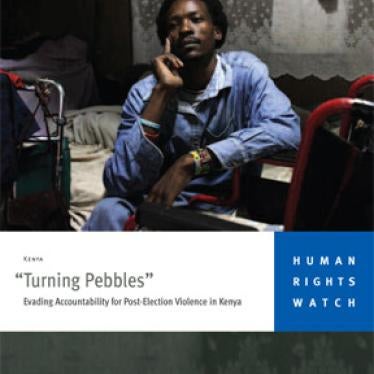(Nairobi) – Four years after the 2007-2008 post-election violence, the Kenyan police and judicial system have failed to adequately investigate and prosecute crimes and to ensure justice for victims, Human Rights Watch said in a report released today. While the International Criminal Court (ICC) has taken on a handful of key cases, Kenya should establish a special judicial mechanism in its justice system to bring broader accountability, Human Rights Watch said. It should also provide compensation for victims, starting with the 21 or more victims of police shootings who have won civil suits against the Attorney General, but to whom the government has failed to pay court-ordered compensation.
The 95-page report, “‘Turning Pebbles’: Evading Accountability for Post-Election Violence in Kenya,” examines the police and judicial response to the violence following the 2007 elections, which pitted ruling party supporters and the police against opposition-linked armed groups and civilians. Human Rights Watch found that of the 1,133 or more killings committed during the violence, only two have resulted in murder convictions. Victims of rape, assault, arson, and other crimes similarly await justice. Police officers, who killed at least 405 people during the violence, injured over 500 more, and raped dozens of women and girls, enjoy absolute impunity.
“Kenyan officials have repeatedly promised to investigate and prosecute the post-election violence, but the handful of convictions demonstrates a lack of will to follow through,” said Daniel Bekele, Africa director at Human Rights Watch. “Kenya should tackle these cases head on with a special judicial mechanism strengthened by international judges and prosecutors and insulated from political interference.”
The report is based on 172 interviews and analysis of 76 court files in Nairobi, Rift Valley, Western, Nyanza, and Coast provinces.
The ICC prosecutor has brought cases against six high-profile suspects accused of crimes against humanity. The cases have progressed despite a series of political and legal maneuvers by the Kenyan authorities to try to postpone or prevent prosecutions. A pretrial chamber is expected to decide in January 2012 whether there is enough evidence for the cases to proceed.
One Kenyan activist told Human Rights Watch the ICC is “the first institution [Kenyan politicians] have come across that they cannot bribe, kill, or intimidate,” making it the focus of many victims’ hope for justice. But hundreds of other perpetrators of serious crimes continue to evade accountability. These crimes include the more than 1,000 killings and 300 enforced disappearances in Kenya’s Mt. Elgon region, also linked to the election violence.
Human Rights Watch identifiedthe principal weaknesses in the criminal justice system that have contributed to the paltry number of convictions. Police officers have been unwilling to investigate and prosecute their colleagues, the general quality of investigations has been poor, and some police prosecutors have proven incompetent, Human Rights Watch said. Political influence and corruption subvert the judicial process; and Kenya lacks an operative witness protection system.
A Kalenjin elder in Eldoret told Human Rights Watch, with respect to accountability for the post-election violence, “We are very good at saying we don’t leave a single stone unturned, but we don’t turn a single stone. Maybe we turn pebbles.… Small stones are turned. The big ones, no one dares.”
Human Rights Watch found that while some perpetrators were convicted of petty crimes, most of those responsible for serious crimes – and virtually everyone suspected of organizing the violence – have benefited from impunity.
The call for a special tribunal within Kenya – first issued by the Waki Commission of Inquiry into Post-Election Violence in October 2008 – remains relevant and urgent, Human Rights Watch said. That is especially true given concerns about the independence and competence of the Kenyan justice system, the evidence Human Rights Watch has documented, and the fact that the ICC is likely to only take on a small number of cases.
Kenyan parliament and cabinet members proposed legislation to establish a special tribunal on several occasions in 2009, but they failed to pass it. On December 15, 2010 – one year ago – President Mwai Kibaki announced, “The government is fully committed to the establishment of a local tribunal to deal with those behind the post-election violence, in accordance with stipulations of the new constitution.” In the year since, no concrete steps have been taken to establish a local tribunal.
Kenya should move forward on establishing a special judicial mechanism locally while continuing to cooperate with the ICC, Human Rights Watch said. A special mechanism would bridge existing gaps if it is insulated from political interference and equipped with the necessary expertise through a mix of national and international professionals. Kenya should also undertake efforts to improve police investigations and to recruit and retain highly qualified civilian prosecutors.
The government should immediately release full funding for the Witness Protection Agency, which was launched earlier in 2011 but has not yet protected a single witness. It should pay out compensation to victims who have already won civil cases against the government for police shootings during the post-election violence. The government should settle other civil suits that remain in progress, and establish a comprehensive reparations policy for victims of human rights violations.
“Under international law, Kenya has an obligation to prosecute serious international crimes, and all victims of such crimes have the right to justice,” Bekele said. “Providing redress for post-election violence victims is a requirement, not an option. Four years after the violence, victims have been waiting for justice for far too long.”







